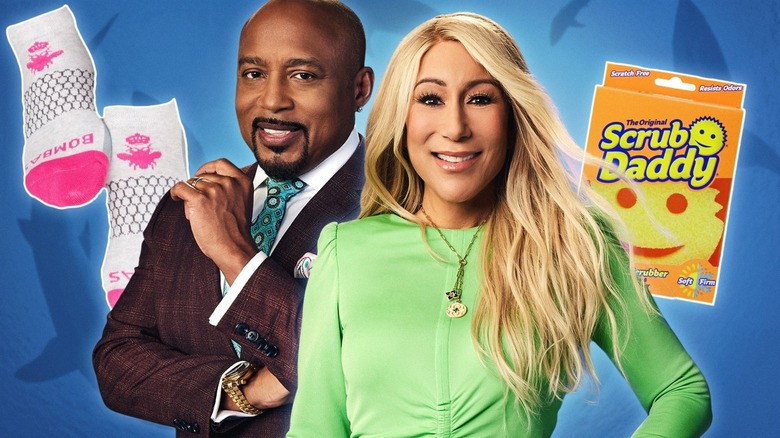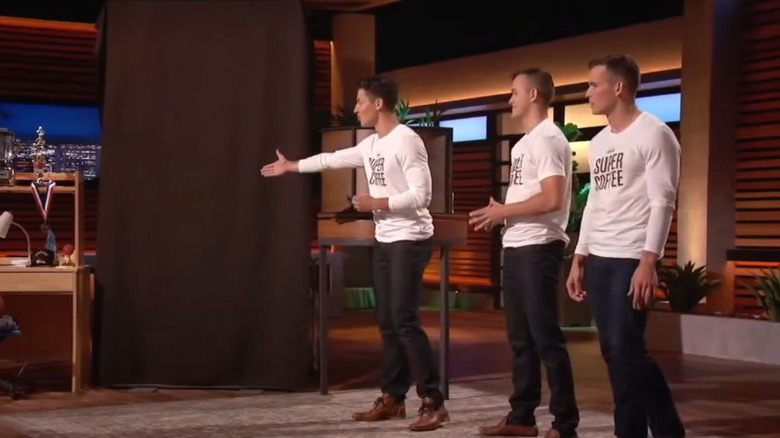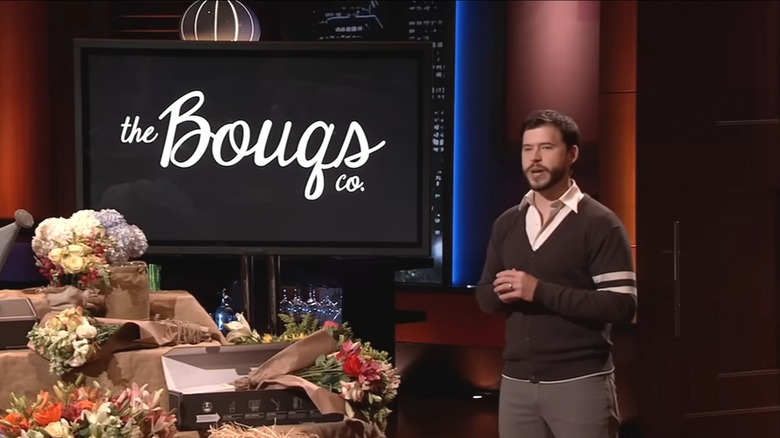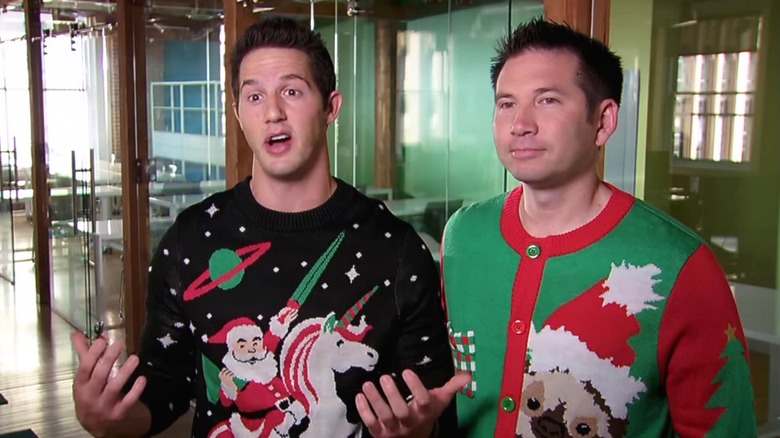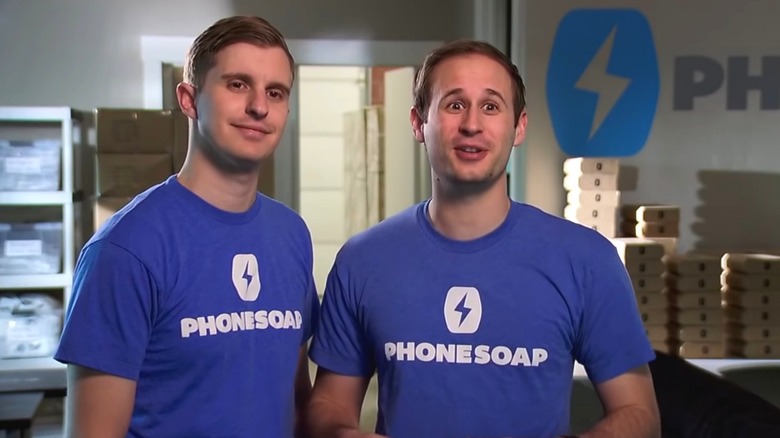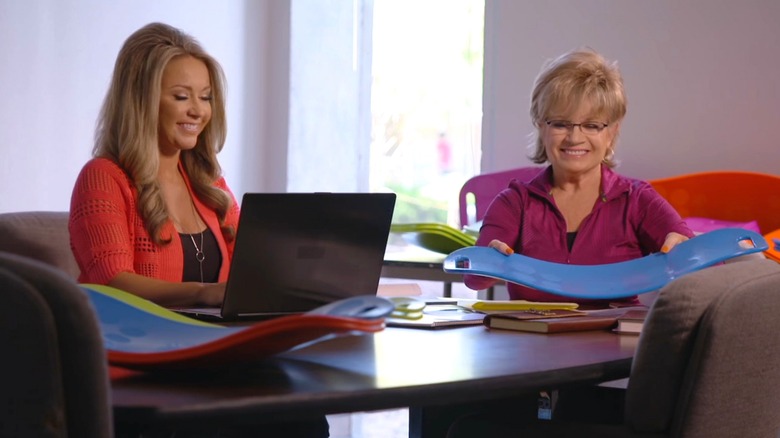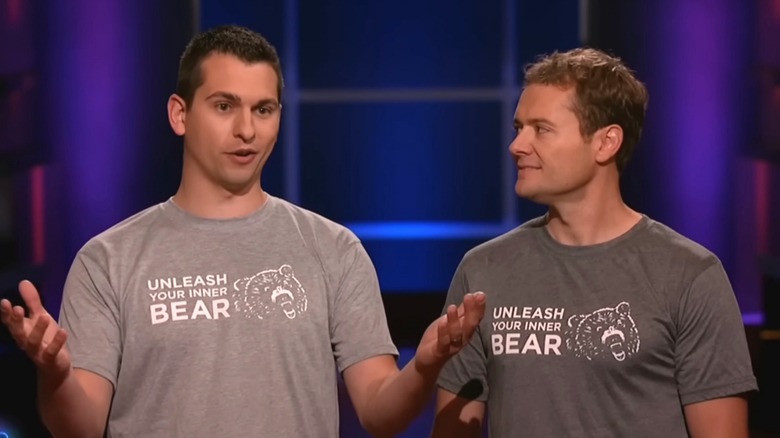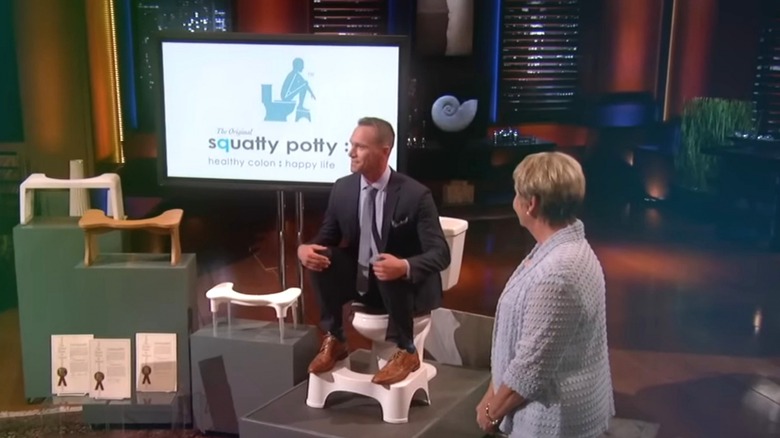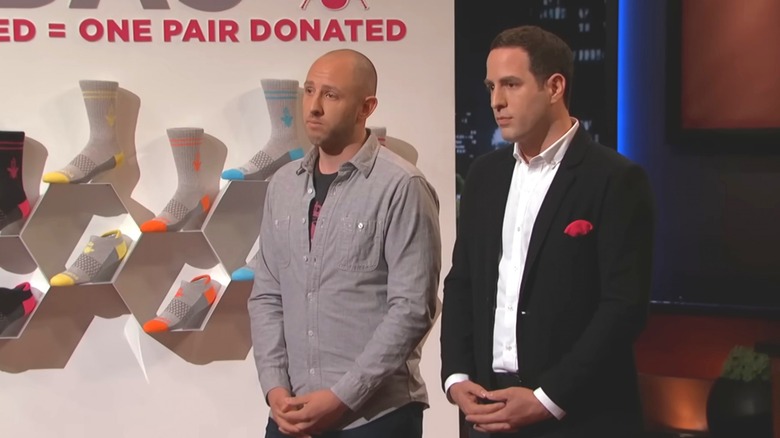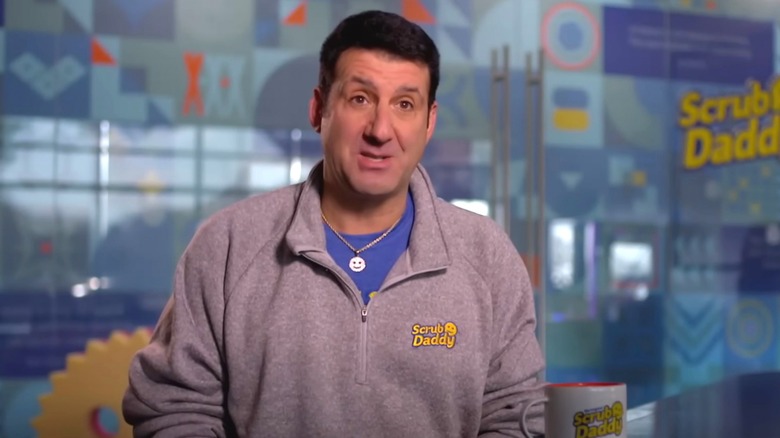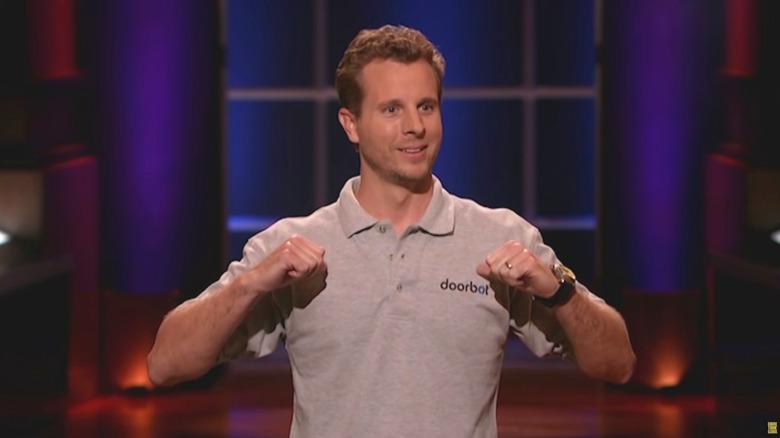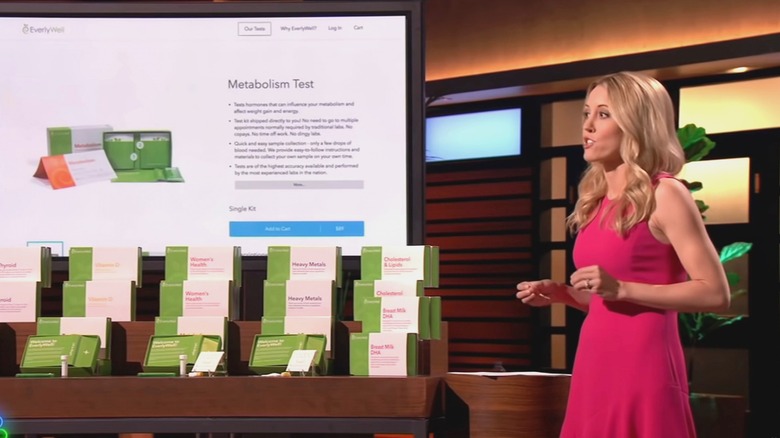The Most Successful Shark Tank Products Ranked
For fans of business-themed reality shows, few do it better than "Shark Tank." Since 2009, a revolving cast that has mainly included "Sharks" Kevin O'Leary, Mark Cuban, Robert Herjavec, Lori Greiner, Daymond John, and Barbara Cocoran have been giving out deals to up-and-coming entrepreneurs, helping them start their businesses. While some of the presentations have most certainly been duds, more than a few of the products have gone on to become wildly successful.
By now, the show is popular enough that just appearing on it is good enough for a boost in sales via "The Shark Tank Effect," so even if your product doesn't get picked up, there's really no downside to appearing on the show — provided your pitch isn't disastrous. In fact, several products that the "Sharks" ended up passing on have turned into multimillion-dollar, or in some cases even one-billion-dollar companies.
As of October 2023, "Shark Tank" was already in its 15th season and has racked up an impressive 23 Primetime Emmy nominations with a solid four wins. Looking back at the past 14 years, these are by far the most successful "Shark Tank" products, ranked.
11. Sunniva Super Coffee
In 2018, brothers Jake, Jim, and Jordan Decicco appeared on "Shark Tank" to pitch their coffee-based energy drink called "Sunniva Super Coffee." Sporting matching t-shirts — which they dramatically revealed in unison to start their pitch — the Decicco brothers waste no time explaining their idea to the "Sharks" of creating a healthy energy drink to replace all of the unhealthy drinks dominating the market. Yet, despite some enthusiasm from a few of the "Sharks," the brothers ultimately walk away from "Shark Tank" without securing any deals.
However, that did not stop the Deciccos from pursuing their idea, and they still ended up becoming one of the most successful products to ever appear on the show. After the show, "The Shark Tank Effect" helped them secure funding and/or endorsements from some pretty high-profile celebrities, including sports stars Aaron Rodgers, Alex Rodriguez, and Baron Davis, as well as actors Jennifer Lopez, Patrick Schwarzenegger, and Kevin Hart.
When they pitched on "Shark Tank," the brothers estimated they were going to do around $2 million in sales that year, but they ended up being terribly mistaken, as Super Coffee would actually do $4 million in 2018 instead. By 2020, that number had jumped all the way to $55 million, and they had secured $175 million in funding, too. As of 2021, the company was valued at more than $500 million following an investment of $106 million that August. For the "Sharks," rejecting Super Coffee was surely one of their worst misses.
10. The Bouqs Company (flower delivery service)
In 2014, John Tabis appeared on "Shark Tank" to pitch his online floral delivery service he called "The Bouqs Company." During his pitch, Tabis seems like a likable enough person, and he reveals healthy profit ranges in the 40%-50% range and what looks like solid sales. Tabis says his company is already valued at $5.2 million, but most of the "Sharks" are less than enthused about going into business with him, and as a result, he does not find any investors.
However, failing to secure a deal on "Shark Tank" was far from the end of The Bouqs Company, and they are absolutely thriving today. Interestingly, even though "Shark" Robert Herjavec passed on the company at first, he ended up having a change of heart several years later when it was time for his own wedding. Herjavec called Tabis about doing his wedding in 2016, and he was so thrilled with the experience he decided to become an investor himself — it also didn't hurt that they had addressed his biggest criticism on the show by adding an overnight delivery service.
By 2019, four years after appearing on the show, The Bouqs Company had reached $55 million in funding. They also had already delivered $30 million in flowers and boasted $100 million in total sales. By 2020, they had acquired $74 million in funding. Not too bad for a company originally rejected by the "Sharks."
9. Tipsy Elves (clothing)
When Evan Mendelsohn and Nick Morton brought their "Tipsy Elves" ugly sweater pitch to the investors on "Shark Tank" in 2013, many of the viewers at home instantly fell in love. Mendelsohn and Morton start their presentation with a fashion show of sorts, where they exhibit several of their different ugly sweater and hat designs, including an elf sweater and a hilarious bucktooth-Rudolph sweater dress. While several of the "Sharks" are skeptical that such a company will ever become profitable or big time, Robert Herjavec decides to take a chance and offers them $100,000 in exchange for 10% equity in the company.
Needless to say, Herjavec's investment has turned into one of the best on the show. In 2015, Tipsy Elves was featured on the inaugural episode of "Beyond the Tank," a spin-off of "Shark Tank" that followed up with successful products from the show. During their appearance, they reveal that Tipsy Elves has grown to $7.5 million in annual sales, and Herjavec predicts that the company will soon reach $100 million in total profits.
Four years later, in 2019, Herjavec's prediction was proven right, as the company was already worth $125 million. Two years later, in 2021, they moved into a massive 7,500-square-foot office in the East Village of San Diego, showing immense growth. Today, Tipsy Elves is still going strong, and they are probably Herjavec's best "Shark Tank" investment.
8. PhoneSoap
In terms of the most useful products from "Shark Tank," Dan Barnes and Wes Laporte have a pretty good claim with their device "PhoneSoap," which uses UV-c light to sanitize smartphones. Barnes and LaPorte appeared on "Shark Tank" back in 2015, and their product instantly resonated with millions of viewers, most of whom undoubtedly own smartphones. During their pitch, the two demonstrate how shockingly dirty the average smartphone is, showing the obvious need and appeal for their product. With a healthy profit margin and more than half a million in sales within the last five months, the guys are able to entice Lori Greiner to invest, and she signs on for $300,000 for 10% equity.
It's not hyperbole to say that after getting Greiner on board, the PhoneSoap absolutely exploded in popularity. When "Shark Tank" gave an update on PhoneSoap just over a year later, sales had jumped all the way to $4.9 million. Greiner took an active part in the business by appearing with it on infomercials, and it has quickly become one of her most successful products. They have also expanded their line with new products that clean everything from tablets to video game controllers.
In 2022, Greiner gave an update from her website about the success of PhoneSoap, and it's pretty staggering. While they were only at $4.9 million in 2016, the update claimed sales of more than $150 million in 2022 — not too shabby.
7. Simply Fit Board
The "Simply Fit Board" was one of the more unique pitches on "Shark Tank," given that it is owned by a mother-daughter duo, Linda Clark and Gloria Hoffman. Hoffman and Clark were on the show in 2015, showing off their home exercise equipment board. First, Hoffman and Clark show the "Sharks" how to use the board before a few of them take a turn on it — to varying degrees of success. Still, the product is attractive to "Shark" Lori Greiner, who eventually gives them $125,000 in exchange for 20% equity in the company.
When "Shark Tank" gave an update on the Simply Fit Board just over a year later, the results were pretty incredible. While before the show aired, they had just done just shy of $600,000 in sales, "The Shark Tank Effect" led to them doing a whopping $1.25 million in sales within a day of the episode appearing. Soon, Hoffman, Clark, and Greiner were promoting the board on QVC, and they later made a very profitable infomercial. Within 7 months, the trio's sales had jumped all the way to $9 million, and things were still looking up.
Greiner provided an update on her website in 2021, saying the company had done $160 million in total retail sales in the six years since being on the show, and the board was available in 50,000 stores. Profitable and practical, the Simply Fit Board is the ultimate "Shark Tank" product.
6. Kodiak Cakes
When the product "Kodiak Cakes" appeared on "Shark Tank" in 2014, it seemed like its inventors, Cameron Smith and Joel Clark, had come up with a pretty solid product. The Kodiak Cakes are healthy pancake mixes made of 100% whole grain with no added ingredients or GMOs. While a few of the "Sharks" are interested in a potential deal, Smith and Clark end up turning them down because they do not find any of the offers favorable.
Though they never secured a deal, "The Shark Tank Effect" helped them grow in popularity. Viewers of "Shark Tank" had a much higher opinion of the Kodiak Cakes than the investors on the show did, and soon, the product line expanded to several different breakfast options and choices.
Eight years after appearing on "Shark Tank," CNBC gave an update on their success after the show. According to CNBC, by 2020, Kodiak Cakes was worth an incredible $200 million and could be bought in 26,000 stores. Things have continued to look up for the company since then, and in 2021, a private equity firm L. Catterton, purchased them for undisclosed terms. In 2022, the company was able to secure actor Zac Efron as the chief brand officer and for their board of directors, giving the company a huge celebrity spokesperson and face. Unfortunately for the "Sharks," Kodiak Cakes will always be one of the ones that got away.
5. Squatty Potty
Admit it, of all the products you would have expected to become hits from "Shark Tank," the "Squatty Potty" was probably not too high on your list. When Bobby Edwards and his mother, Judy Edwards, presented the Squatty Potty on "Shark Tank" in 2014, their initial pitch got more than a few odd looks and smiles from the "Sharks" thinking about investing in it. The entire concept of the Squatty Potty, helping to make defecating less strenuous by straightening your colon by raising your legs on a stool, is almost comical to some of them.
Yet, they aren't laughing at the $2.7 million in pure online sales, which shows just how profitable the company has already become in just a few years. There is some stiff competition among the "Sharks" to secure the Squatty Potty, but the Edwards end up going with Lori Greiner and her offer of $350,000 for 10% equity. As soon as Greiner came aboard, Squatty Potty began partnering with several major retailers, and now the company is sold in stores throughout the world.
When CNBC gave a 2021 update, they had done a solid $175 million in sales, which was pretty impressive in just seven years. Later that year, Greiner gave an update on Squatty Potty from her website, claiming $222 million in retail sales. The Squatty Potty is definitely one of the most unique "Shark Tank" products out there, and as it turns out, it's also one of the most successful.
4. Bombas (socks)
In addition to becoming one of the most successful "Shark Tank" products in history, "Bombas" is also one of the most feel-good stories, too. In 2014, Bombas' owners David Heath and Randy Goldberg appeared on "Shark Tank" to sell their unique athletic socks. Not only do Heath and Goldberg show how their socks are excellently made, they also reveal a huge humanitarian aspect to their business: donating 1 pair of socks to the homeless for every pair they sell. Of all the "Sharks," only Daymond John is interested, giving them $200,000 for 17.5% in equity (though apparently, these were renegotiated to undisclosed terms afterwards).
Heath and Goldberg created the company in 2013, and by 2015, they had already donated 900,000 pairs of socks and were making $4.6 million per year. By 2017, revenue exploded to $46.6 million, and in 2018, they surpassed the $100 million mark in annual sales. At that point, Bombas had expanded past just socks into all kinds of clothing, including shirts and underwear. In 2020, Bombas launched a line of rainbow socks in celebration of LGBTQ+ Pride Month, and matched the sales with sock donations to the LGBTQ+ community.
In 2021, CNBC gave an update on Bombas, and it was incredibly impressive. According to Heath, by then, the company had done a shocking $225 million in revenue and donated more than 30 million socks to the homeless. This is one investment John is certainly happy he made.
3. Scrub Daddy
Of all the products to appear on "Shark Tank," the "Scrub Daddy" is definitely one of the most practical. The Scrub Daddy is an incredibly effective sponge that can get rid of tough stains without leaving any scratches, and it's very easy to clean. It appeared on "Shark Tank" in 2012, and when inventor Aaron Krause started presenting the product to the "Sharks," a bidding war emerged between Lori Greiner, Daymond John, and Kevin O'Leary. In the end, it's Greiner who ends up winning, hashing out a deal with Krause to the tune of $200,000 for 20% equity.
By far, it was one of Greiner's best business decisions ever. Just four years later in 2016, Krause, Greiner, and the Scrub Daddy appeared on the "Shark Tank" spin-off "Beyond the Tank," where it was revealed that Krause had already racked up an impressive $75 million in sales. In 2021, Greiner updated the success of the Scrub Daddy on her website, claiming that it had done over $400 million in sales and was available in more than 30,000 stores across 17 different countries.
Already very successful, even by "Shark Tank's" standards, the show offered another update in early 2023. By now, Krause claimed an incredible $670 million in retail sales and was even able to shift production to the United States, making the product American-made for the first time. For such a small product, it's pretty incredible the sales the Scrub Daddy has done so far.
2. Doorbot (Ring)
Looking back, of all the misses on "Shark Tank," it's likely that the "Ring Doorbell" stings the most. When Jamie Siminof appeared on "Shark Tank" back in 2013, the Ring was branded as the Doorbot. Though his pitch went well, and he impressed them with $1 million in sales coming in, most of the "Sharks" were skeptical about the viability and profitability of the product, and as a result, it was only Kevin O'Leary who even offered a deal. Unfortunately, O'Leary and Siminoff could not come to an agreement, and Siminoff walked out with an offer. It was a huge mistake by the "Sharks."
Soon after appearing on "Shark Tank," Siminoff rebranded the Doorbot as the Ring, and it eventually became the best-selling video doorbell on the market. By 2018, Ring had offices in California, the United Kingdom, and Amsterdam and employed more than 1,500 people. That year, Siminoff sold Ring to Amazon for an estimated $1.2-1.8 billion, an incredible number considering the company was only a couple of years old.
In 2021, Ring had become popular enough that they sold 1.7 million video doorbells, absolutely crushing their competitors and dominating the market share. For his part, Siminoff was not bitter over not getting a deal and said that his appearance on the show led to the company's success, and he thanked them for giving him exposure in a 2018 interview with CBS.
1. Everlywell (test kits)
Of all the hundreds of products to have appeared on "Shark Tank" by now, it's hard to argue there have been any more successful than Everlywell. Pitched on "Shark Tank" back in 2017 by Julia Cheek, Everlywell is a health testing company that offers at-home test kits for a huge variety of things. These can range from STI testing to food sensitivity testing to allergy and testosterone testing.
Though Cheek's pitch is pretty spot on, all of the "Sharks" drop out relatively quickly except for Lori Greiner, and she offers Cheek a somewhat unique deal. In exchange for 5% equity, Greiner gives Cheek a loan of $1 million at 8% interest rate, and the deal is settled.
In just two years, sales had already jumped up to $65 million from $2.5 million before Cheek went on the show. In 2021, Greiner offered an update on Everlywell from her website, saying the company had done an amazing $300 million in total sales by then in just four years. In 2020, Everlywell had a valuation of an astonishing $1.3 billion with annual sales of $200 million, and in 2021 they acquired a major health care company, PWNHealth and Home Access, pumping up the valuation to a mind-blowing $2.9 billion. Needless to say, this was by far Greiner's best investment on "Shark Tank," turning $1 million into equity valued at over $145 million.
